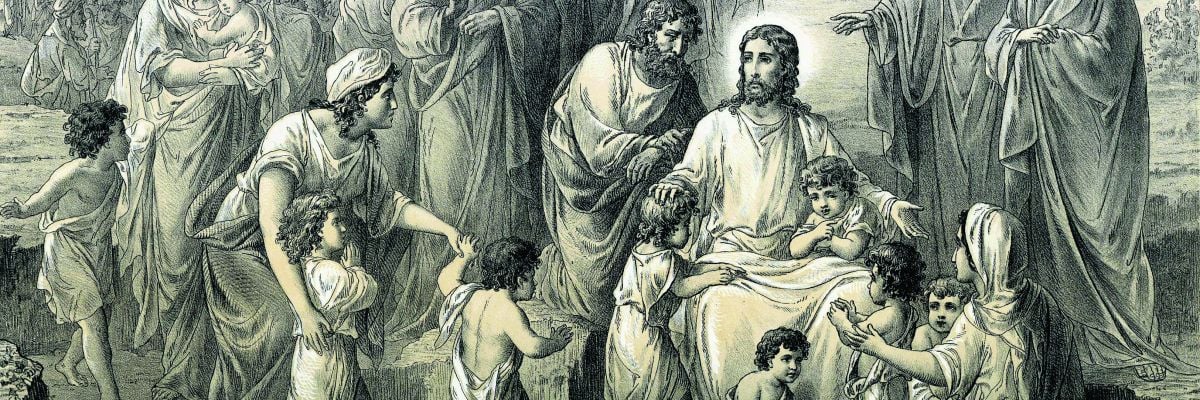
The kingdom of God encompasses the redemption of humanity that we might be renewed in Jesus Christ the King and attain eternal salvation. This nascent kingdom is announced to Abram in Genesis 12:1-3, a passage known as the “acorn of salvation history,” which concludes, “By you all the families of the earth shall bless themselves.” God renames Abram “Abraham,” for he will be a “father of a multitude of nations” (Gen. 17:5). The Lord makes three covenants with Abraham, promising that his descendants would become:
- A great nation (Gen. 15), fulfilled in the founding of Old Covenant Israel by Moses and grounded in the twelve tribes of Jacob-Israel (Exod. 24)
- A great kingdom (Gen. 17), initially fulfilled in David and his royal descendants who reign over the kingdom of Israel (1 Samuel 16ff.)
- A “catholic” or universal blessing (Gen. 22:18), i.e., one meant to impact all nations.
David is of the tribe of Judah, the tribe of Israel from whom God says kings would one day arise (Gen. 49:10). In naming his royal successor, David says his son Solomon will “sit upon the throne of the kingdom of the Lord over Israel” (1 Chron. 28:5). So we see the kingdom of God in its first stages in Old Testament times.
But this earthly realm would come to ruin, culminating in the destruction of the Temple in Jerusalem in 586 B.C. However, prophets such as Amos and Isaiah proclaim God would one day restore his kingdom and fulfill his universal blessing to the nations (Amos 9:11-12; Isa. 11:1-10).
Jesus Christ is that long-awaited king, the anointed or messianic son of David and Abraham (Matt. 1:1). Because he is God incarnate, “the Word became flesh” (John 1:1-3; 14) and thus “the King of kings” (Rev. 17:14), Jesus’ reign over the restored kingdom of Israel will never end (Luke 1:31-33). In fulfilling the universal blessing promised to Abraham, Jesus emphasizes that his kingdom is for everyone (Matt. 28:19), for God desires that no person should perish (1 Tim. 2:4; 2 Pet. 3:9; see CCC 846-48).
From prison, John the Baptist asks if Jesus really is the messiah king. Jesus proclaims how he has fulfilled Isaiah’s prophecy of the Redeemer: “Go and tell John what you hear and see: the blind receive their sight and the lame walk, lepers are cleansed and the deaf hear, and the dead are raised up, and the poor have good news preached to them” (Matt. 11:4-5). Miracles abound in Christ’s earthly ministry, illustrating his reign extends over all creation.
By all appearances, Jesus’ rule ended in ignominy on Calvary, but Jesus shows the purpose of kingdom in triumphing over sin and death on our behalf (John 3:16-17; Heb. 5:7-10), rising from the dead and ascending into heaven. Jesus inaugurates his kingdom in power, sending the Holy Spirit on Pentecost to dispense his atoning graces won on Calvary (Acts 2).
To enter God’s kingdom, one must be born again, beginning in baptism (John 3:3-5, Acts 2:38), which not only forgives our sins but also renews us in the Holy Spirit (Tit. 3:5, 1 Pet. 3:21), enabling us to “become partakers of the divine nature” (2 Pet. 1:4).
Jesus exhorts his followers to “seek first his kingdom and righteousness” (Matt. 6:33) and tells them they “must be perfect, as your heavenly Father is perfect” (Matt. 5:48), because hard is the road that leads to eternal life (Matt. 7:13-14). Jesus sustains us with himself, particularly in our commemorating his one redemptive sacrifice in which we partake of his eternal-life-giving body and blood in his “New Covenant” Passover (Luke 22:19-20, John 6:48-59; see 1 Cor. 10:14-22, 11:23-32).
Living as a disciple of Christ in his kingdom is not a solitary sojourn but one in which we are intimately united in the Lord (John 17:20-23; see 1 Cor. 12:12-26). Jesus restores the kingdom of Israel on the foundation of his twelve apostles, who succeed the twelve tribes of the Old Covenant (Eph. 2:19-20). Jesus sends his apostles as the Father has sent him (John 20:21), with “all authority in heaven and on earth” to teach, govern and sanctify his people (Matt. 28:18).
And thus Christ’s teaching, the truth that sets us free, now and forever (John 8:31-32), is necessarily also “the apostle’s teaching” (Acts 2:42; see Matt. 28:20), with Peter and his papal successors leading God’s kingdom, the Church, on earth (Matt. 16:18-19, Luke 22:31-32). Consequently, entering and remaining in the kingdom of God requires self-denial (Matt. 16:24-25) and childlike fidelity and humility (Matt. 18:1-4), “for the wisdom of this world is folly with God” (1 Cor. 3:19).
Jesus is with us always (Matt. 28:20), yet he will return in glory at his Second Coming (Acts 1:11), vanquish the devil and his minions, and deliver the kingdom to his Father so that we can reign with the Lord in his heavenly kingdom forever (1 Cor. 15:24).



